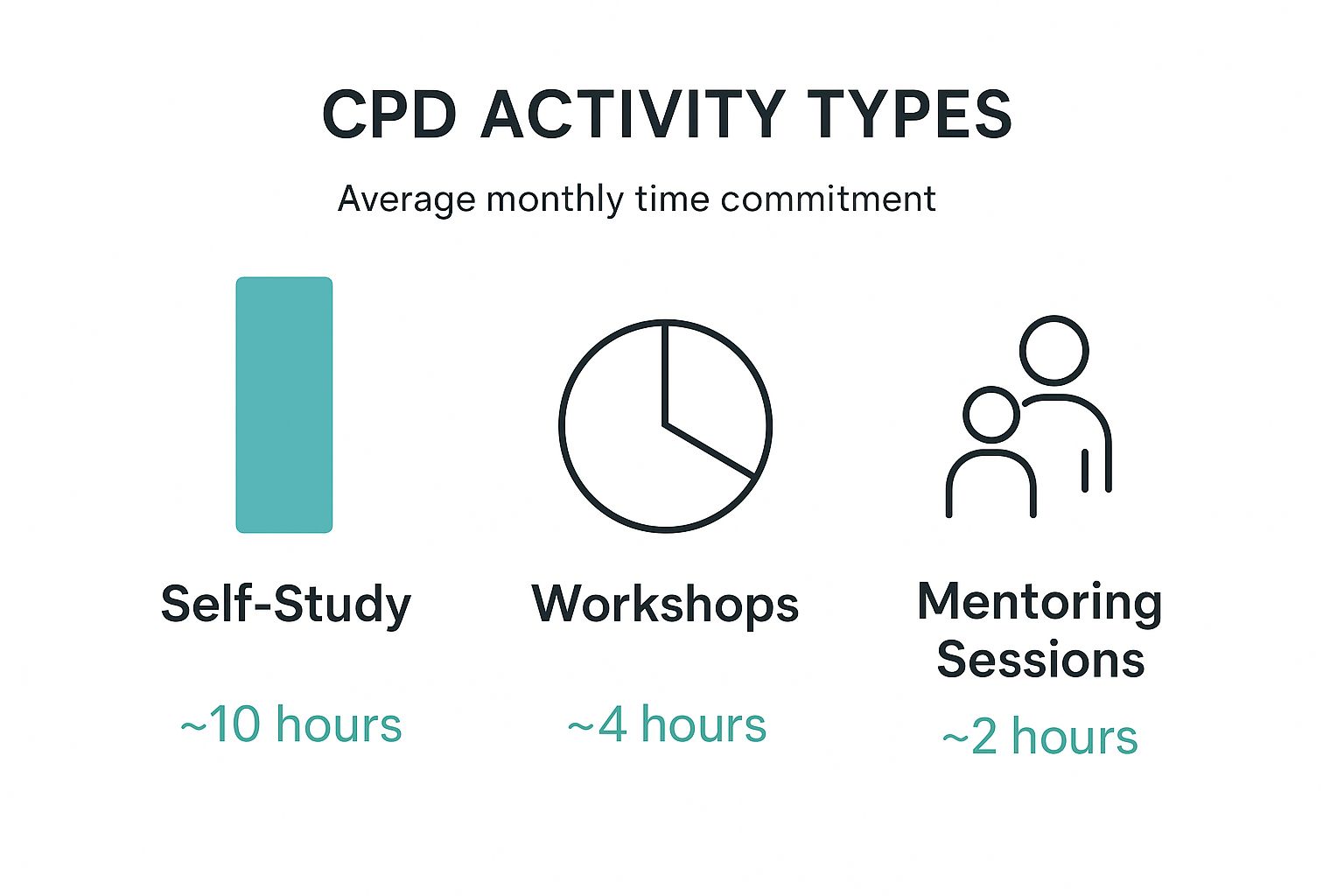
Ever wondered how the best professionals stay at the top of their game? It’s not by accident. They commit to a simple but powerful habit: Continuing Professional Development (CPD).
So, what is continuing professional development? Think of it as your personal commitment to never stop learning and growing in your career. It’s the ongoing, conscious effort you make to keep your skills sharp, your knowledge current, and your professional toolkit ready for whatever comes next. CPD ensures you're not just competent, but confident and adaptable in a world where job roles and industries are always shifting.

You could compare CPD to the regular software updates your phone gets. Without them, apps become sluggish, security gets patchy, and eventually, it just can't keep up. Your career is no different. CPD is that essential update process, keeping you efficient, secure in your role, and ready for new industry demands.
It’s a simple cycle you can apply to your own growth: you reflect on where you are, plan where you want to go, take action to learn, and then look back at what you’ve achieved.
This isn’t just a theory. A social care worker might review challenging cases with a mentor to refine their support strategies. An engineer could dedicate an hour each week to webinars on new sustainable materials. It’s this practical, tailored approach that makes CPD so valuable.
The magic of CPD is that it’s not a box-ticking exercise you rush through once a year. It's a continuous habit that genuinely shapes your entire professional journey for the better.
What’s In It For You? The Key Benefits of CPD
Getting into the habit of CPD brings some brilliant, tangible benefits. It's not just about pleasing your boss; it's about investing in yourself.
-
Boost your confidence: When you know you’re up-to-date, you feel more capable and self-assured in your role.
-
Build your credibility: A proven track record of ongoing learning makes you a much more compelling candidate for promotions or new jobs.
-
Become more resilient: By staying on top of emerging trends, you’re better prepared to navigate industry changes rather than being caught off guard.
CPD At a Glance
To break it down even further, let's look at the core components that make up the CPD cycle. This simple framework is the engine that drives your professional growth.
|
Component |
Description |
|---|---|
|
Reflect |
Taking an honest look at your current skills to pinpoint what you need to learn next. |
|
Plan |
Setting clear, achievable goals and figuring out the best activities to help you reach them. |
|
Do |
Actually getting stuck in! This is where you attend the course, read the book, or practise the new skill. |
|
Evaluate |
Looking back to see what worked, documenting what you’ve learned, and deciding what to focus on next. |
Following this cycle builds real, long-term momentum in your career. It’s especially vital in regulated professions like nursing, teaching, or finance, where you often need to provide documented proof of your learning to maintain your licence to practise.
For those in education, the landscape is always evolving. To get a broader perspective on modern trends, A Modern Guide to Professional Development for Educators offers some great insights into current strategies.
Why CPD Is a Career Game-Changer
Viewing continuing professional development as just another box to tick is a huge mistake; it’s one of the smartest investments you can make in your future. When you dedicate time to your growth, you're actively ensuring you stay relevant, can adapt to industry changes, and avoid that dreaded feeling of career stagnation.
This commitment to learning is what really makes you stand out in a competitive job market. It shows ambition, a proactive mindset, and a resilience that every employer is looking for. It’s not just about adding new skills to your CV, either – it genuinely boosts your confidence and how much you enjoy your day-to-day work.
The Proof Is in the Progress
This isn't just talk; there’s solid evidence to back it up. A fascinating whitepaper from The CPD Standards Office discovered that a staggering 90% of UK professionals felt their career had directly benefited from CPD activities.
The research also showed a big shift towards flexible online learning, especially among younger generations, which makes slotting development into a busy schedule easier than ever. You can read more about what they found by checking out the future of CPD.
By taking ownership of your learning, you move from being a passenger in your career to being the one in the driver's seat, actively steering toward your goals.
Ultimately, CPD turns you into someone who is indispensable. It gives you the fresh, up-to-date knowledge needed to solve modern problems and lead with authority. If you want to dive deeper into this, you can learn more about the benefits of upskilling in our detailed guide.
The Critical Role of CPD in Regulated Fields
For many professionals, continuing professional development is far more than just a good idea—it’s a non-negotiable part of the job. In regulated industries like nursing, social work, and teaching, CPD is mandatory to keep your licence to practise. This isn’t just bureaucracy; it’s an essential system designed to protect the public and maintain the highest possible professional standards.

These requirements are in place to make sure practitioners are always up-to-date with the latest knowledge and skills, which is vital for delivering safe, effective, and ethical services.
A System Built on Lifelong Learning
The UK's health and social care sector is a fantastic example of CPD in action. Here, lifelong learning is stitched into the fabric of the entire system to ensure exceptionally high standards of care are met.
In fact, a huge collaboration in 2017 saw 21 professional bodies and unions come together to establish the 'Principles for CPD and lifelong learning'. This move signalled a powerful, sector-wide commitment to ongoing education. Discover more insights into these CPD principles.
This unified approach acknowledges a simple truth: supporting staff with quality training isn’t just a ‘nice to have’—it’s fundamental to delivering the excellent patient care that everyone deserves.
Practical Ways to Engage in CPD
Long gone are the days when professional development meant being stuck in a lecture hall all day. The great thing about CPD is its flexibility. You’re free to mix and match different activities that fit your learning style, your schedule, and your career goals. It’s all about finding what works for you.
You can blend structured courses, reflective thinking, and self-led learning to create a plan that feels balanced and, most importantly, useful. This approach ensures you’re not just passively absorbing information, but actively thinking about how to bring it into your everyday work.
Finding Your Ideal Mix
The most effective CPD plans often weave together a variety of activities to keep things interesting and help you build a well-rounded set of skills.
Here’s a breakdown of the main approaches you can take:
-
Structured Learning: This is the most formal type of CPD, involving activities with clear learning goals. Think of things like online courses, hands-on workshops, or even pursuing a formal qualification. If you're weighing up your options, our guide on whether online short courses are worth it offers some valuable pointers.
-
Reflective Practice: This is all about looking back at your own experiences to figure out what went well and where you can improve. It might be as simple as keeping a journal, asking for feedback from a manager, or joining peer review sessions. It’s learning from doing.
-
Self-Directed Activities: This is any learning you take on under your own steam. The possibilities are endless! It could be reading industry blogs and journals, listening to expert podcasts, watching relevant documentaries, or networking with peers at an industry event.
The image below gives a great visual of how you can easily fit these different activities into your routine.

As you can see, creating a balanced and effective learning habit is more manageable than you might think.
Kick-Start Your Career Journey with Stonebridge
Are you ready to start a career where professional development is part of the journey? Getting that first, foundational qualification is the best way to begin, and at Stonebridge Associated Colleges, we’re here to help you take that step with confidence. We specialise in career-focused programmes designed to get you into rewarding fields like nursing, health and social care, and education.

We believe that education should fit around your life, not the other way around. That’s why our courses are offered through a flexible and affordable subscription model that puts you in control.
Flexible Learning That Works for You
With Stonebridge, you can build the knowledge you need to step into a profession that truly values lifelong learning, all on your own terms. Our unique subscription-based approach comes with some real advantages:
-
Study 100% Online: Learn from anywhere, at any time. You can easily tailor your studies around your existing work and family commitments.
-
No Long-Term Debt: Forget being tied into lengthy credit agreements. Our simple monthly subscription makes learning accessible without the financial strain.
-
Pause or Cancel Anytime: Life can be unpredictable. Our model lets you pause your studies when you need to and pick them right back up when you’re ready.
Our Access to Higher Education Diplomas are a particularly popular pathway. They provide the precise qualifications you need to apply for university degrees in nursing, midwifery, social work, and other essential professions that require ongoing CPD.
Stonebridge empowers you to gain recognised credentials and launch a meaningful career, making high-quality education both accessible and stress-free.
The Future of Professional Development
Just as the world of work is constantly shifting, so too is professional development. Gone are the days of stuffy, week-long training courses being the only option. The future is all about learning that fits around your life, not the other way around.
One of the biggest changes we’re seeing is the rise of micro-learning. Think of it as building your skills in short, sharp bursts of 5 to 10 minutes. This approach makes it so much easier to keep your knowledge fresh without having to carve huge chunks of time out of an already packed schedule.
Digital credentials are also becoming the new standard. Instead of a paper certificate gathering dust in a drawer, you can now earn digital badges and certificates that live online. This makes sharing your achievements incredibly simple – they slot perfectly into your LinkedIn profile or digital portfolio for everyone to see.
It’s Not Just About Technical Skills
While job-specific knowledge is always important, employers are placing a huge emphasis on soft skills. Things like critical thinking, problem-solving, and adaptability are now seen as essential. After all, businesses need people who can think on their feet and pivot when things don’t go to plan.
Emotional intelligence is another big one, helping to build stronger teams and more effective leaders.
In 2025, targeted CPD grants reached English and maths educators, reflecting a national push to fund skill growth. You can read the full update on these targeted grants from the Department for Education.
The move towards personalised learning paths is also shaping the future of CPD. A one-size-fits-all approach is officially out. Understanding what is personalised learning is becoming crucial for creating development plans that genuinely match an individual’s career goals and existing skills.
How National Strategies are Closing Skill Gaps
It’s not just individuals and companies that see the value here; governments are getting involved too. By strategically funding CPD initiatives, they’re helping to close critical skill gaps in the workforce. In the UK, for instance, we’re seeing more programmes designed to align professional training with the real needs of the market.
This top-down approach proves that CPD isn’t just a ‘nice-to-have’ – it’s an essential part of a thriving economy. When you look at the trends together, a clear picture emerges:
-
Micro-learning modules for quick, on-the-go knowledge boosts.
-
Digital badges and credentials to verify your skills online.
-
A major focus on soft skills workshops delivered virtually.
-
Targeted grants and funding to support vital sectors like education.
Ultimately, this all points towards a more agile and responsive model for professional growth. CPD is a living process, not a static, tick-box exercise. By embracing these modern approaches, you ensure that you stay not just relevant, but genuinely impactful throughout your career.
Ready to start a career where professional development is part of the journey? Explore subscription courses at Stonebridge Associated Colleges: https://www.stonebridge.uk.com




